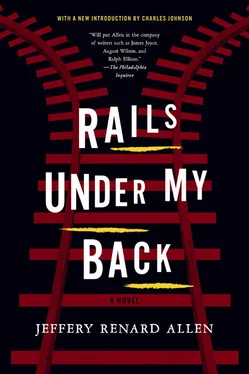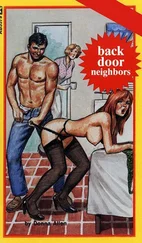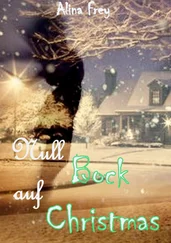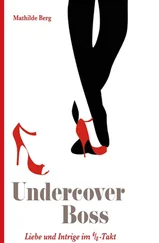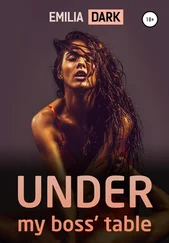The sink gargled its steel throat. Bed legs from the room above him bucked from one end of the ceiling to the other, and the ceiling showered peeling paint down on him. He curled into sleep. Dreamed close to the surface.
His bed drifted. He woke and turned on the lights. Rats — five or six of them — scattered for the dark. He pulled a candy bar from his shirt pocket and tossed the two halves into two corners.
The new day dawned fair and fresh. Found him here. Coney Island. To discover ocean in New York, lower Manhattan was the obvious, convenient choice. But the long train ride to Coney Island offered the illusion of journey. He journeyed here to ocean because over there he had never been aware that ocean was ocean, hadn’t been convinced, even after he was told. Sea was just another word. Water was water. And the water felt like the waters back home, Tar Lake, hot summer waters, even if it had a salt smell and taste. He wanted to feel the ocean, this ocean.
A breeze strolled down to the boardwalk where the sand began. He dared not go barefoot on the beach. (He’d heard that dope fiends left their needles in the sand.) He walked, the impact of his steps darkening the sand, leaving puddles. The white sand broke loose in footprint after footprint. Clouds sailed in a westward armada. Gulls scratched through a rusty sky, circling ocean for minute after minute on a single wingbeat. Flocks of them wandered the beach on stick legs. The sea swelled, curled, broke in a long line, washing foam up on the beach, and slipped back down the beach to come back and re-form, break again in a long line, and slice back again, sound retreating with the wave to travel some invisible place and spill a great surge of noise. Lines of woven hemp trailed out into the ocean. Skeletal driftwood. And seaweed like discarded wigs. The green sea broke into silver on the beach. Lucifer stooped over sand — fish scales glistened like coins — grabbed a fistful, then stood, the sand dribbling out of his hand. He stooped again to gather pieces of seashell almost purple from the brackish water. Then he stood and looked at the sea, the waves now white and slow as sheep. All he saw was surf out there, more and more of nothing. He wiggled his toes, a wet feeling causing him to look down at his shoes. He had ruined them, a good pair. Sand spilled from the laces. The sides breathed like gills.
HATCH SMELLED THE CITY’S CHOKED SEWERS. He curled through the tangled streets of South Lincoln. John had brought him here. And Jesus. He had been drawn into the elongated circle of their will. He grafted unknowns to unknowns. If he had winged eyes, they could fly and find John. If he could make boats of his words, they would sail and find Jesus. How could he halt what had already been set in motion? Maybe blood ain’t—
An angle of brick stabbed him. The concrete snatched him down. His eyes spilled spinning suns. He rubbed his head. His fingers felt no blood. The wheeling slowed to a stop. He and another boy both sat on their butts with their arms extended behind them. The boy pulled himself up on an invisible string. He was slow to follow.
Sorry, he said.
Bitch, why don’t you watch where you going?
He felt sun on his shoulders. Listen, ain’t no need fo all that.
You don’t like it? The boy poked his hard face into Hatch’s. He’s the same height as me. Why, he’s the spittin image of —He wore a hat, bomb-pointed crown aimed at the sky above, straps dangling like girl’s pigtails. Bitch, I’m talkin to you. The boy had eyes like sucked-out shells. Dry ice or frozen spit. A nasty gray light glowing in them.
I was jus turnin the corner.
Bitch, I ain’t ask you what you was jus doin. The words bat-flew out of the boy’s black grave mouth. Hatch breathed in gravedigger breath. He saw. Face behind the words. Face behind the breath. Little fly hairs of mustache. A black hole of mouth. Oh, he’s smilin. That’s what he’s doing. Grinning. Sneering. Crooked tombstones of teeth. I wanna know what you gon do now.
Hatch said nothing.
Bitch. I didn’t think so. The boy’s eyes traveled the entire orbit of Hatch’s body. I oughta smoke you. The boy slid his hand in the breast pocket — Napoleon-like — of his athletic jacket. Least make you suck my dick. His eyes ran a second orbit. Bitch, get outa my face.
The words pushed Hatch away. Made his legs move as fast as they could. But not fast enough. At the next corner, the boy leaned his face out of a red ambulance. Buck! Buck!
Hatch ducked to the safety of the sidewalk. Tried to camouflage himself in concrete. Laughter rose from beneath burning tires. Bitch. The ambulance speeded away.
THE SHADOW-SWAMPED TREES shimmered like black ghosts. Thinned against the stars. Moon burned over the rim of the horizon. Blackened headstones blazed in the night, cracked old people’s faces, leaning, here and there a name or date barely legible. What did it matter? The years telescoping, he might have lived out the rest of his life in this single discovery.
He continued under the hot stars. Chill struck through his clothes. His veins drew it in, then spilled it from the faucet of his head, down the pipe of his neck, and throughout the basin of his body. He moved with no exercise of will, only the habit to endure. He looked down at his feet. They were far off, almost out of sight, under black water. He felt himself slipping away in the dead moment before dawn. I am no longer the same person I was, he thought. He was going home. A forbidden city.
THE STREETLAMPS STRUNG THROUGH THE NIGHT LIKE BEADS. Hatch and Abu stood in the yard, their still eyes following the back of the receding ambulance.
Keylo, Hatch said.
What?
That was Keylo.
Who?
He followed me here.
What?
Hatch looked at the star-filled night and breathed deeply. Nobody, Hatch said. He had already said too much.
You said Keylo, didn’t you? Keylo from Red Hook?
Forget it.
How you know it was him?
Hatch said nothing.
What he doing round here?
Jus forget it. I was mistaken, that’s all.
Where you been?
Who said I been anywhere?
Yo mamma called looking for you.
Hatch searched for an answer. I was over at Elsa’s house.
Why you ain’t call?
I was busy. I was getting my groove on.
Oh. Abu redirected his embarrassed eyes. You get the tickets?
What?
The tickets. You know, for Spin’s—
Oh. Forgot all about that. They was closed.
Closed?
Yeah. You know, the flood and all. We’ll get them tomorrow. Hatch turned toward the house.
Abu followed behind him, trying to keep pace. What did T-Bone want?
Oh, you know.
What did he want?
It ain’t important.
If it ain’t important how come—
Hatch gave Abu a look for an answer. Stared him down. Looks have language. Abu turtle-shrunk into himself. Hatch reached the housefront. He did not stumble. The low-rising steps were easy flying.
Once inside the house, Hatch phoned Sheila to ease her fears. (He knew precisely what to say. Much practice.) Then he clicked off the lights. Abu made no complaint.
They had the house to themselves until the morning. (Abu’s parents worked nights.) In complete silence, he and Abu sat as one until dawn, their still eyes forming shapes to guard off the dark space of absence.
A BODY GETS AROUND. Traveling. To see the cities of men. Travel a little further and see as much as you can see.
Well, I hope you have a nice trip.
I plan to.
Porsha sat at the window — the sky has nearly forgotten the sun; how many days now? no sight no sound no touch — and watched the evening invade the avenue.
Читать дальше
